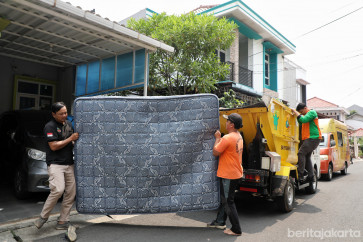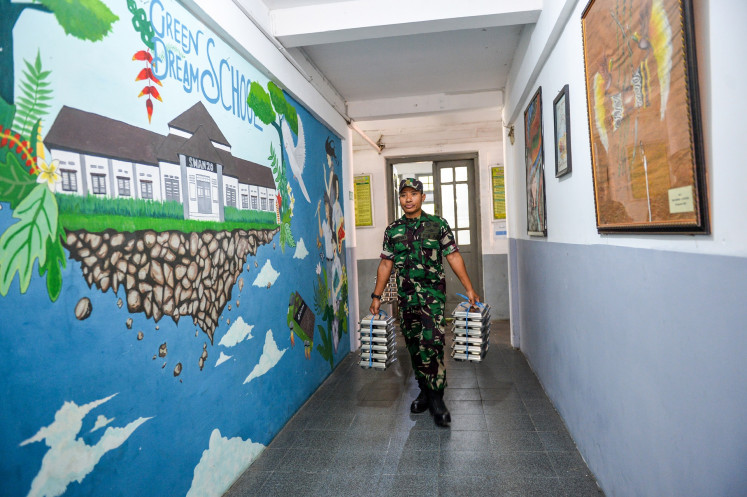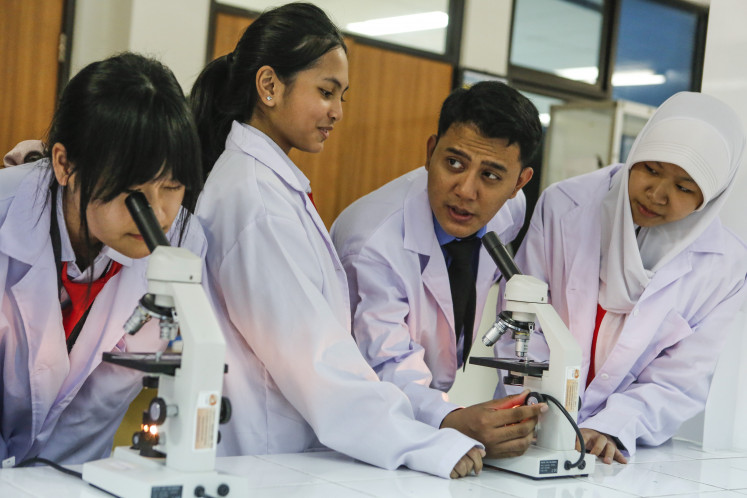Popular Reads
Top Results
Can't find what you're looking for?
View all search resultsPopular Reads
Top Results
Can't find what you're looking for?
View all search resultsBatik, urban farming programs help residents
Urban farming: Workers finish hydroponic equipment to be used to grow vegetables at Marunda Rusunawa in North Jakarta
Change text size
Gift Premium Articles
to Anyone
U
span class="caption">Urban farming: Workers finish hydroponic equipment to be used to grow vegetables at Marunda Rusunawa in North Jakarta. Urban farming provides a little extra income for some Marunda residents.(JP/P.J. Leo)
Known as President Joko “Jokowi” Widodo’s favorite low-cost apartments (rusunawa), Marunda Rusunawa in North Jakarta, shows that efforts from the city administration can help evictees adapt more easily to their new lives.
When he was governor, Jokowi relocated thousands of residents living on the sides of the Pluit Dam in North Jakarta to Muara Baru and Marunda.
The Marunda Rusunawa consists of three clusters — A, B and C — each of which has 10 blocks of 80 to 100 apartments. The rusunawa accommodates almost 3,000 families.
Marunda is actually an old rusunawa that previously failed to attract even the most desperate evictees to stay permanently because of its remote location in the northeastern corner of the city.
But Jokowi’s efforts have made the rusunawa more successful. The governor from October 2012 to October 2014 initiated the Green Hydroponic Farmers program and batik training to help tenants generate new incomes after they lost their former livelihoods.
To accommodate farmers, two greenhouses were built on 40 x 10 meter plots of land in Cluster A and B. The Marunda farming groups grow spinach, mustard, chilies and eggplant. Each cluster accommodates 10 farmers.
Farmer Agus Haryanto, who resides in Cluster A, said when it came to harvest season, the farmers could produce, for example, up to 20 kilograms of chilies. Each farmer could reap Rp 400,000 (US$30.49) from the total sales.
“The greenhouse is always productive and the quality of the vegetables is also good,” he said.
However, Agus said the groups found it hard to sell the produce in bulk so instead offered the vegetables door-to-door to neighbors.
Education facilities, including early childhood education programs, kindergarten and elementary schools are available. School buses are also available for students whose schools are far away.
Although Marunda is considered good relative to other rusunawa, it still has its problems, such as the persistent problem of remoteness. The complex is about an hour by motorcycle from the nearest commuter train station, Kampung Bandan. To reach Cilincing district, where residents can attend to administrative matters, also takes around an hour.
Although many Transjakarta buses service the area, they are not a popular means of transportation because residents say heavy traffic from a nearby industrial zone makes the buses run at a snail’s pace.
A one-hour motorcycle ride can be a three-hour bus ride, they say.
Resident Rina Puspa Dewi said the isolation made her reluctant to go elsewhere. Her two children stay at a relative’s house in Penjaringan, North Jakarta, to make it easier for them to go to college and work.
Despite the challenges she faced at the rusunawa, Dewi said she had enjoyed a batik course provided by the Jakarta Handicraft Council (Dekranasda).
“At least I can have an additional activity and income,” Dewi told The Jakarta Post on Tuesday.
“After the training, which lasts a month, we will draw batik. Usually, drawing a two-and-a-half-meter long by one-meter-wide piece of batik will take two months to finish,” she said, adding that she could earn Rp 800,000 for such a piece.
She said that for making a batik design on a shawl, she earned Rp 100,000. “It takes less time — I could finish it in a week,” she said.
She added that Dekranasda would sell the batik at a festival.
The program, Dewi said, was open to anyone. However, from 100 participants initially, she added, there were now only around 15 active members.
Meanwhile, Rusmiyati, a businesswoman who has been managing a Minang food stall at the rusunawa for five years, said what supported businesses in the area was interactions with people outside.
“Most of my customers are STIP students. I can’t rely on Marunda tenants only,” she said, referring to the state-run Indonesian Merchant Marine Academy (STIP).
Rusmiyati said her customers had significantly decreased since the city administration stopped STIP students from renting apartments at Marunda. The academy is located a kilometer away from the complex.
“When the students, captain and officers of the STIP were still allowed to live here, gross income could be up to Rp 3 million daily,” Rusmiyati said, adding that she now grossed around Rp 1 million a day. (fac)










